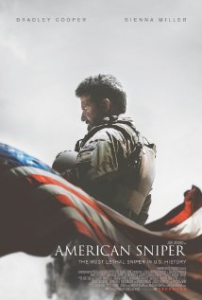
The hit thriller and drama, “American Sniper,” directed by actor Clint Eastwood, was released in theaters Jan 16. The film, based on the memoir American Sniper: The Autobiography of the Most Lethal Sniper in U.S Military History, profiles the book’s author, deceased former Navy SEAL Chris Kyle (who served four tours in the Iraq War). Starring Oscar nominee Bradley Cooper as Kyle, “American Sniper” perfectly demonstrated how the Iraq War transformed countless soldiers, by focusing on the life of the deadliest sniper in American military history.
The movie begins with the pre-Navy Kyle, who strived to maintain the lifestyle of a rodeo cowboy. Cooper seamlessly transformed into the burly 220-pound man, from gaining a significant amount of weight to perfecting a southern accent. Cooper’s commitment to accurately portraying Kyle’s physical attributes also shines through his behavior and mannerisms. He exudes a carefree yet empty persona, while highlighting Kyle’s deep-set dedication to protecting others (a constant theme throughout the film).
The montage of new SEAL recruits undergoing the infamously brutal training instilled anticipation and patriotism in the audience. I enjoyed how this collection of scenes incorporated humor, as the rest of the movie left little room for laughs.
Along with his affinity for defending others, Kyle’s close relationship with his wife Taya Kyle (Sienna Miller) and family was a crucial part of “American Sniper.” Their joyful romance before Kyle was deployed to Iraq made their future difficulties all the more painful and sad. As their relationship progressed and the amount of tours Kyle served increased, troubles emerged that real-life military couples can relate to. In one scene, Taya dramatically pleaded to the stoic Kyle for him to mentally return to his role as a doting father, as he displayed symptoms of Post-Traumatic Stress Disorder (PTSD) in between tours. I was immensely moved by how Miller and Cooper used the right amount of drama to portray a couple that was desperately holding on to their marriage by one strong strand— devotion.
Perhaps the most emotional scene in the film was also the most silent. Kyle, while protecting Marine troops from Iraqi rooftops, spotted a woman and her child exit a complex. In this intense encounter, Kyle observed the woman as she removed a grenade from beneath her robes, handing it to her child. Kyle shot and killed the woman and her child before they could harm the Marines. I appreciated how little dialogue was exchanged, as this let viewers become engrossed in the heaviness of this powerful scene, opening my eyes to the bloody reality of Kyle’s occupation.
In fact, the portrayal of Kyle and his position as a sniper aroused controversy amongst the media, political, and celebrity world. Some individuals labeled “American Sniper” as war propaganda, with its patriotic tone and somewhat glorified image of Kyle. Director Michael Moore recently expressed his opinion, which came with immediate backlash, on Twitter, stating, “…We were taught snipers were cowards. Will shoot you in the back. Snipers aren’t heroes.”
Despite the claims of some that the film promotes war and a negative image of Muslims, I found the flick to be a dramatic profile on Kyle’s life. Due to the meticulous efforts of Eastwood and Cooper, every movement, mannerism, and spoken word contributed to the film’s believability. “American Sniper” not only was an entertaining watch, but an emotional movie that provoked thoughts of the damaging effects of war on soldiers and civilians.
Rating: 4.5 out of 5 stars
“American Sniper” successfully incorporated the usual themes to a military movie (warfare, comradery, patriotism, etc.) while entering the less-explored theme of PTSD. The minimal amount of dialogue during powerful scenes added a subtle intensity to the film. However, in one scene, during a passionate conversation between Kyle and Taya, Cooper cradles an obviously fake baby. The absurdity of its extremely faux appearance subtracted from the emotional performance by Cooper and Miller. Other than the fake infant, the rest of the movie successfully transported me into early 2000s-era America, ridden by war and an influx of mentally-damaged veterans.